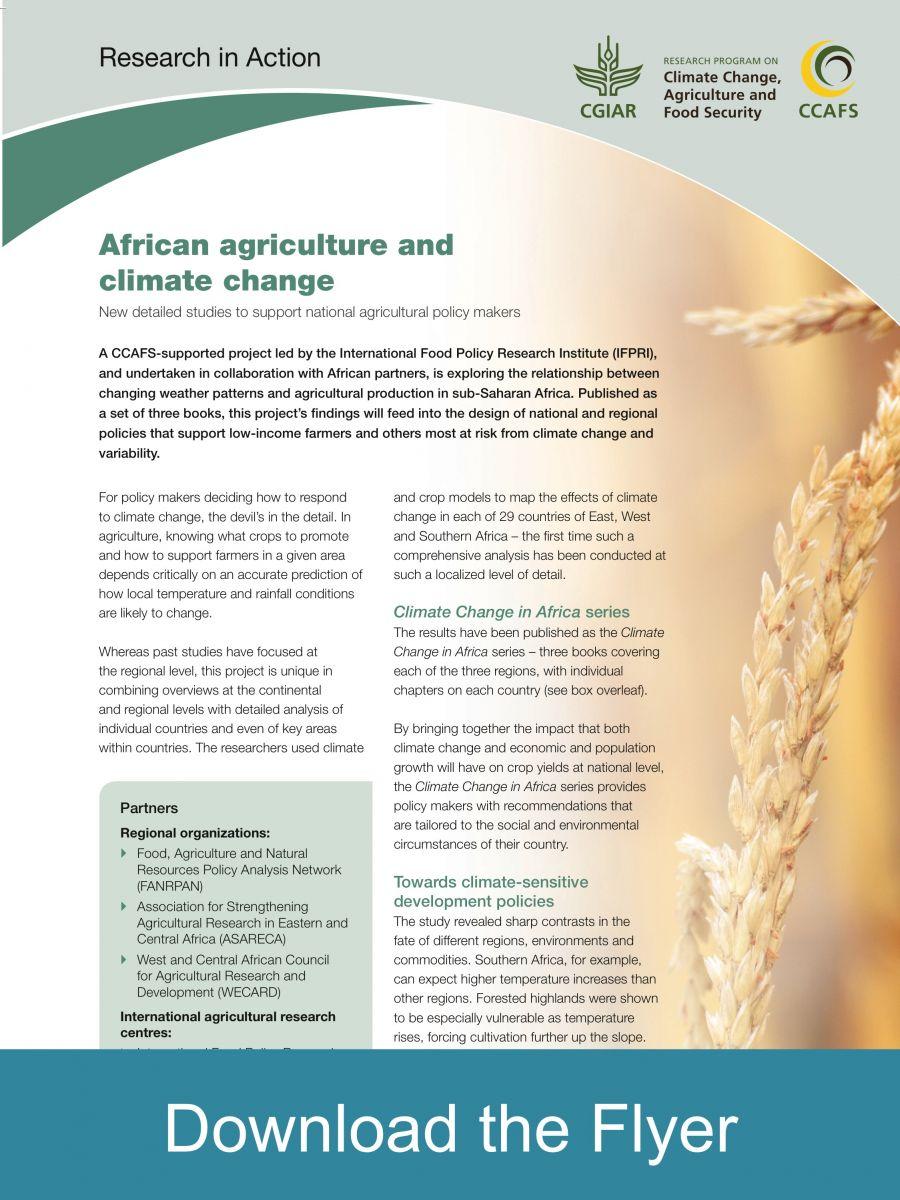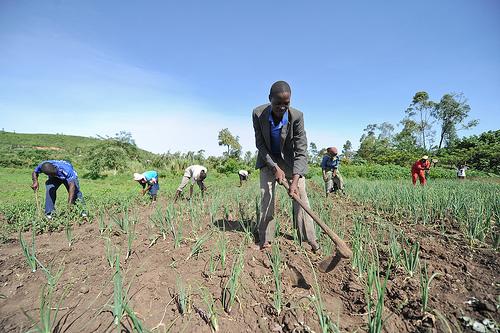African Agriculture and Climate Change books

New detailed studies to support national agricultural policy makers in Africa
 A CCAFS supported project led by the International Food Policy Research Institute (IFPRI) and undertaken in collaboration with African partners is exploring the relationship between changing weather patterns and agricultural production in Africa south of the Sahara. Published as a set of three books, this project's findings will feed into the design of national and regional policies that support low-income farmers and others most at risk from climate change and variability.
A CCAFS supported project led by the International Food Policy Research Institute (IFPRI) and undertaken in collaboration with African partners is exploring the relationship between changing weather patterns and agricultural production in Africa south of the Sahara. Published as a set of three books, this project's findings will feed into the design of national and regional policies that support low-income farmers and others most at risk from climate change and variability.
For policy makers deciding how to respond to climate change, the devil's in the detail. In agriculture, knowing what crops to promote and how to support farmers in a given area depends critically on an accurate prediction of how local temperature and rainfall conditions are likely to change.
Whereas past studies have focused at the regional level, this project is unique in combining overviews at the continental and regional levels with detailed analysis of individual countries and even of key areas within countries. The researchers used climate and crop models to map the effects of climate change in each of 29 countries of East, West and Southern Africa – the first time such a comprehensive analysis has been conducted at such a localized level of detail.
Climate Change in Africa series
Partners
Regional organizations:
- Food, Agriculture and Natural Resources Policy Analysis Network (FANRPAN)
- Association for Strengthening Agricultural Research in Eastern and Central Africa (ASARECA)
- West and Central African Council for Agricultural Research and Development (WECARD)
International Agricultural Research Centers:
- International Food Policy Research Institute (IFPRI)
Funding Agencies:
- Federal Ministry for Economic Cooperation and Development (Germany)
- Bill and Melinda Gates Foundation
The results have been published as the Climate Change in Africa series – three books covering each of the three regions, with individual chapters on each country.
By bringing together the impact which both climate change and economic and population growth will have on crop yields at national level, the Climate Change in Africa series provides policy-makers with recommendations that are tailored to the social and environmental circumstances of their country.
What's in the books?
In each book, policy-makers will find details of predicted changes in rainfall and temperatures at regional, national and local levels. The books go on to analyse the likely impact of these changes on crop yields, showing where these are expected to increase, decline or remain steady. Using the IMPACT model developed by IFPRI and its partners, this analysis is combined with the effects of technology improvement to give a range of possible outcomes. Acknowledging that farmers don't grow crops in a social and economic vacuum, the country chapters also predict how income and population growth will affect crop production – and how the resulting availability and price of food will affect consumption. These predictions are used in turn to paint future scenarios for commodity prices, agricultural trade patterns, food prices, calorie consumption and child malnutrition – the key indicators that policy makers need in order to make the right investment decisions.
Many uncertainties surround such a complex analysis. The aim of the study was to circumscribe these, providing policy makers with the full range of scenarios for which their countries need to prepare. A useful outcome has been to point up areas and commodities on which there is broad consensus between different models on the direction and degree of probable change and those on which there is not.
Towards climate-sensitive development policies
The study revealed sharp contrasts in the fate of different regions, environments and commodities. Southern Africa, for example, can expect higher temperature increases than other regions. Forested highlands were shown to be especially vulnerable as temperature rises, forcing cultivation further up the slope. The picture for maize is variable, with some areas showing increased yields, but wheat is highly sensitive to heat and likely to experience a steep fall in yields while sorghum was also shown to be surprisingly sensitive. Policy makers will need to place special emphasis on defining appropriate responses for these and other elements likely to come under increasing pressure. Above all, measures will be needed to support and protect vulnerable people, many of whom may be forced to alter their production systems radically or even to migrate as agriculture becomes impossible.
Protecting and restoring threatened or degraded environments will become particularly important as climate change adds to existing pressures on the natural resource base. Policy support for research and development should include the following priority themes:
- The reclamation of degraded land, for example by planting trees to prevent soil erosion and improve the microclimate.
- Agroforestry systems that combine trees and crops and include species that are drought-tolerant.
- Water harvesting and irrigation, especially in countries with large arid and semi-arid zones.
- Secure land tenure, so that smallholders are confident that they can invest in their land.
- Energy-saving stoves, to reduce the cutting of trees for firewood and charcoal (while other sources of energy such as wind and solar are investigated and developed).
Institutional measures will be needed to support climate-resilient development. New research programs and development projects will need to be designed and funded, with the emphasis on new plant varieties as well as improved natural resource management. It will be vital to build the human, institutional, infrastructural and financial capacity to design and implement policies, as well as to monitor their impact.
Joining up science and policymaking
The three reports had their origins in a global study led by Gerald Nelson, a former IFPRI Senior Research Fellow, which began in 2010. As the work unfolded it became clear that regional and individual country reports would be needed to produce the fine-scale, localized detail that would provide policy makers with the detailed guidance they needed in order to act. IFPRI researchers worked through the CCAFS network to identify regional partners and national authors to conduct further research and to secure the necessary funding. This partnership approach was adopted primarily to harness national knowledge, but also to ensure buy-in by the policy community.

BY BRINGING TOGETHER REGIONAL, NATIONAL AND CONTINENTAL LEVELS, THE NEW CLIMATE CHANGE IN AFRICA SERIES WILL HELP POLICY MAKERS MAKE INFORMED DECISIONS THAT CAN DRIVE CLIMATE RESILIENCE ON THE GROUND AT LOCAL LEVEl. pHOTO: N.PALMER
To further cement the links between research and policymaking that will lead to action, the researchers will present their results at a series of national climate change planning meetings attended by senior government decision makers. The books are also being launched at various global and regional events and promoted through the media.
Key Links and Resources
Access the publications online
Download the flyer
Blog: New report reveals how climate change will hit West Africa
Blog: What is the potential impact of climate change on African farmers
Press Release: Climate change to shift Kenya's breadbaskets